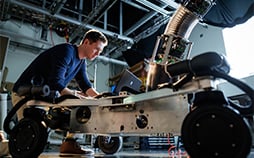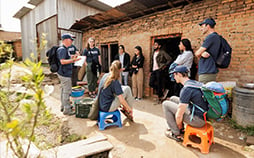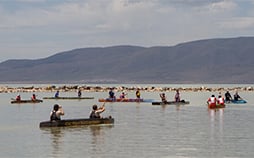BYU Students Help Build “Soft Robots” That Are Safer for Humans
Students in the BYU Robotics and Dynamics Lab are making robots that do the heavy lifting.
September 2024
For many Ecuadorians with leg amputations, a prosthetic device—and the hope of regaining at least a measure of personal and economic independence—had long been beyond reach.
Poverty often compounds life with a disability. How could an individual sacrifice and save enough money for a prosthetic when they can’t walk? What’s more, a protective liner and cosmetic foot shell for a prosthetic can wear out in six months to two years.
BYU students working on a Global Engineering Outreach (GEO) project came up with a solution to this costly, time-consuming, and complicated process. Collaborating with Prótesis Imbabura, a nonprofit prosthetic clinic in Ibarra, Ecuador, the students developed an inexpensive, sustainable manufacturing process that could be done on-site.
BYU students have worked with communities around the world since 2007. In addition to prosthetic consumables, other recent Latin America GEO projects have included cookstove sensors, quinoa washers, and wheelchair cushions.
The partnership with Prótesis Imbabura proved to be a natural fit for a BYU GEO team. “BYU’s mission to go and serve is similar to that of Prótesis Imbabura in that we as professionals have to try to learn and then later give to others,” says the clinic’s lead prosthetist, Jairo Collaguazo. “So, if we have the same vision and can connect, we will be stronger and more able to help people who need it.”
The BYU team’s first goal was to lower costs. Accounting for taxes, tariffs, and shipping, imported liners and foot shells can cost more than $200. The BYU teams worked to keep their material expenses under $30.
“The first few months, the students struggle, because they’re not used to open-ended projects,” says BYU GEO co-instructor and chemical-engineering professor Randy S. Lewis. “They often think their professors know the solution—but we don’t.”
After spending long hours in their Provo lab pouring silicone and testing, the BYU team developed easy-to-execute processes and 3D-printed forms for custom liners and foot shells. This was a complete departure from the large-scale manufacturing processes used in the United States or China.
The team then traveled to Ecuador to see their designs at work. “For the first time in my academic and engineering career, I got to see someone use a product I designed and built,” says Paul K. Walker. “Everything we worked for came together right then, and it was amazing.”
Jairo Rosero, a retired music professor with a lower-leg amputation due to diabetes, arrived at the clinic with a deteriorated liner and foot shell that offered no comfort or support. Like many patients, he was not able to replace the accessories when they wore out.
When fitted with a new BYU liner and foot shell, Rosero said he felt more stable, secure, and confident in his ability to walk. The foot shell feels “somewhat more anatomical, softer, and accommodates the rhythm you have when walking,” he said. “I have the sensation of having a left foot, my own foot.”
Nursing professor Corinna Trujillo Tanner visited the clinic with a student team to produce training videos for the patients and urged her students to be more than observers. She invited the students to “ask patients about their lives, ask them about their experiences, [and] ask them what they’ve learned from living with a disability.”
“Serving abroad isn’t just about what you can teach,” Tanner adds. “We are uniquely positioned to learn from these wonderful people, and we are learning valuable lessons we can learn in no other way.”
Terri Bateman, BYU GEO co-instructor and mechanical engineer says, “By working on these projects, BYU students are increasing their empathy for others while strengthening their design and engineering skills”.
Anya R. Jeppson, says she’s grateful for a chance to pay forward some of what she has received. “BYU has changed my life by giving me an education that brings me closer to God,” she says. “The things that we’re learning can so directly help others and improve the world.”
Read more in “Making Strides” by Michael R. Walker in Y Magazine, fall 2023.

Students in the BYU Robotics and Dynamics Lab are making robots that do the heavy lifting.

An interdisciplinary BYU research team traveled to Nepal to measure brick workers’ exposure to pollutants and to assess their respiratory health.

True story: since the 1960s, engineering students across the country have been building concrete canoes to test their engineering excellence and hydrodynamic design skills. Naturally, they started racing them, and now it’s a thing.